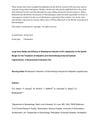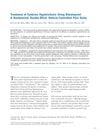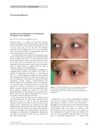Phosphodiesterase Inhibitors and Prostaglandin Analogues in Dermatology: A Comprehensive Review
December 2020
in “
Dermatologic Therapy
”

TLDR Certain drugs are effective for skin conditions like psoriasis, vitiligo, and hair loss.
The document from December 21, 2020, reviewed the effectiveness of phosphodiesterase inhibitors and prostaglandin analogues in dermatology, particularly for conditions like psoriasis, vitiligo, atopic dermatitis, various types of alopecia, and eyelash hypotrichosis. Oral PDEIs such as apremilast were effective for psoriasis and vitiligo, while topical PDEIs like crisaborole ointment 2% were safe and effective for atopic dermatitis. Prostaglandin analogues like latanoprost and bimatoprost showed efficacy in treating pigmentary disorders, vitiligo, hair repigmentation, and alopecia, with bimatoprost being FDA-approved for eyelash hypotrichosis. Studies included in the review showed that latanoprost significantly increased hair density in androgenetic alopecia and, combined with other therapies, led to significant repigmentation in vitiligo. Bimatoprost was effective in promoting eyelash growth in idiopathic and chemotherapy-induced hypotrichosis, with one study reporting a 92.5% satisfaction rate among 585 patients. Additionally, PGE2 and iloprost showed potential benefits for treating vitiligo, oral mucosities, leg ulcers, psoriasis, and systemic sclerosis-related digital ulcers. The review concluded that these medications could serve as alternative or adjunct therapies and recommended further studies to confirm their benefits.



















